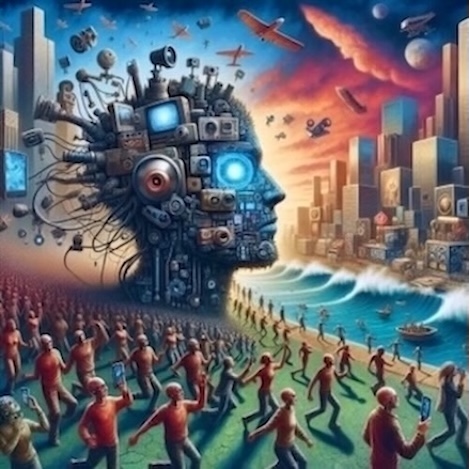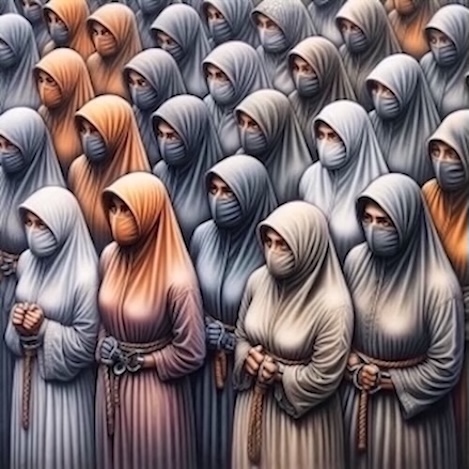How Dominant Perspectives Shape Our World?
Dominant Perspectives Shape Our World through prevailing viewpoints that shape societal norms, influence decision-making, and define cultural narratives. Exploring the insights here will strengthen your knowledge, keep informed and help you decide which to accept and which to refuse, by making informed decisions that improve your life.
 How Dominant Perspectives Shape Our World?: Deceptive dominant viewpoints lull people into a dreamlike state, making them dance, pray, and long for a utopian world... one they can walk into and live in peacefully.
How Dominant Perspectives Shape Our World?: Deceptive dominant viewpoints lull people into a dreamlike state, making them dance, pray, and long for a utopian world... one they can walk into and live in peacefully.The dominant narratives are one of some articles well connected to conventional narratives and the collection of these articles are also intertwined with more than 20 articles following the development of the three last eras in the world exploring the shared components between them and their established narratives. Here are the interconnected articles including this one, which you can read in the sections of the Global Dynamics:
- Why Expanding Horn Africa to Include Other States and Global Impacts?
- A New Era of Chaos and Distrust is Shaping!
- Pre-Cold War Era of Colonialism & Imperial Rivalries!
- Pre-Cold War American Expansionism!
- The Cold War Era: A Battle of Ideologies and Influence!
- Why Do Nations Fragment When Unity is Their Greatest Strength?
- Eastern Europe Socialist Bloc Fragmentation!
- Sudan and U.S. Policy: A Terrorism Connection? What's The Real Story?
- Eritrea Was Too Late to Independence Due to Colonial Conspiracies!
- Namibian Road to Independence From Liberation to Sovereignty!
- The Post-Cold War Era: A Shifting Global Landscape!
- How Economics, Ideology, and Geopolitics Fragment Nations and Create New Ones?
- New World Order: Stability or Chaos?
- Why Am I Saying A New Era of Disorder and Doubts is Shaping?
- Rewriting History: The Lies We Inherit!
- Illusion of Institutional Narratives!
- Why Prevailing Perspectives Fail Us?
- Conventional Narratives Are Always Wrong!
- Rewriting History: The Lies We Inherit!
- How Established Opinions Shape Perception?
- Established Frameworks Invisible Forces!
- Dominant Perspectives Shape Our World!
Dominant Perspectives: How Established Views Shape Society?
Dominant perspectives are the prevailing viewpoints that shape societal norms, influence decision-making, and define cultural narratives. These perspectives often emerge from historical traditions, institutional authority, and media influence, reinforcing established frameworks that dictate how individuals and groups interpret the world. While dominant perspectives provide stability and continuity, they can also limit critical thinking, suppress alternative viewpoints, and reinforce systemic inequalities.
The Formation of Dominant Perspectives
Dominant perspectives do not arise in isolation; they are cultivated through education, governance, media, and cultural traditions. Key factors that contribute to their formation include:
- Historical Legacy → Long-standing beliefs passed down through generations shape societal expectations.
- Institutional Influence → Governments, corporations, and academic institutions establish narratives that define acceptable viewpoints.
- Media Framing → News outlets and digital platforms amplify certain perspectives while marginalizing others.
These forces work together to create widely accepted truths, often making it difficult for alternative perspectives to gain traction.
The Power of Dominant Perspectives in Social Structures
Dominant perspectives influence policy-making, economic systems, and cultural identity. Some key areas where they exert control include:
- Politics → Established ideologies shape governance, often reinforcing existing power structures.
- Science & Technology → The belief that innovation always leads to progress can overshadow ethical concerns.
- Social Norms → Cultural expectations dictate behavior, often marginalizing those who challenge conventional wisdom.
While dominant perspectives provide cohesion, they can also limit diversity of thought, making it essential to critically examine their impact.
Challenging Dominant Perspectives
Breaking away from dominant perspectives requires critical analysis, open discourse, and the amplification of alternative viewpoints. Strategies for challenging established narratives include:
- Encouraging Diverse Voices → Supporting marginalized perspectives in media and academia.
- Questioning Established Norms → Analyzing historical biases and institutional motives.
- Promoting Independent Thought → Encouraging individuals to seek multiple sources of information.
By fostering intellectual curiosity and critical engagement, societies can evolve beyond rigid frameworks and embrace more inclusive, dynamic perspectives.
Dominant perspectives shape the way societies function, influencing everything from governance to cultural identity. While they provide structure and continuity, they can also limit progress and suppress alternative viewpoints. Understanding their formation, impact, and potential for change is essential for fostering a more balanced, inclusive, and critically engaged society.
Connection Between the Three Articles!
The following three articles below explore "how narratives shape perception and influence societal structures". Here’s how they connect:
1. The "Natural Order" Myth in Social Hierarchies
- This article examines "how power is justified through illusion", often using "hierarchical structures" to maintain control.
- It connects to "media-driven fear narratives", as fear can reinforce "social hierarchies" by making people accept authority as necessary for stability.
2. The "Innovation Equals Progress" Assumption
- Challenges the idea that "new technology or ideas always lead to positive change".
- This ties into "social hierarchies", as innovation is often used to "justify existing power structures" meaning those in control dictate what counts as "progress."
- It also connects to "media narratives", as media often "frames innovation as inherently good", influencing public perception.
3. Media-Driven Fear Narratives
- Explores how "information shapes public perception", often reinforcing "existing power structures".
- Fear-based media can "justify hierarchies" by making people believe they need strong leadership to protect them.
- It also influences "how innovation is perceived", making people either "embrace or fear technological change".
Core Connection: Narrative Control & Power
All three articles "examine how narratives" whether about "hierarchy", "innovation", or fear are used to shape public perception and maintain control.
Narrative Control & Societal Influence: How Power, Innovation, and Media Shape Perception?
Throughout history, narratives have played a crucial role in shaping societal structures, influencing public perception, and reinforcing power dynamics. This collection of articles examines three interconnected themes: the illusion of natural order in social hierarchies, the assumption that innovation equals progress, and the media-driven fear narratives that shape collective understanding.
By analyzing how power is justified, how progress is framed, and how fear is weaponized, these articles reveal the underlying mechanisms that govern societal beliefs. Together, they provide a comprehensive exploration of how dominant narratives shape global systems, influencing everything from governance to technological advancements.
Summaries of the Articles:
1. The "Natural Order" Myth in Social Hierarchies: How Power is Justified Through Illusion?
This article explores how social hierarchies are often framed as natural or inevitable, despite being constructed through historical, political, and economic forces. It examines how dominant groups use illusion and rhetoric to maintain control, reinforcing the idea that power structures are unchangeable.
2. The "Innovation Equals Progress" Assumption: Why New Doesn’t Always Mean Better?
Innovation is often equated with progress, but this article challenges that assumption by exploring cases where technological advancements have reinforced existing inequalities or failed to deliver meaningful change. It questions the narrative that new ideas inherently lead to improvement, highlighting the need for critical evaluation of innovation’s impact.
3. Media-Driven Fear Narratives: How Information Shapes Public Perception?
Fear is a powerful tool in shaping public opinion, and this article examines how media narratives amplify fear to influence behavior, justify policies, and reinforce societal divisions. It explores how 2news cycles, political messaging, and digital platforms contribute to a culture of fear2, affecting everything from public trust to global decision-making.
The "Natural Order" Myth in Social Hierarchies: How Power is Justified Through Illusion?
Throughout history, societies have been structured around hierarchies systems that rank individuals based on wealth, status, or authority. These hierarchies are often justified by the idea of a "natural order" the belief that social positions are predetermined by inherent qualities such as intelligence, strength, or moral superiority. But is this order truly natural, or is it a constructed myth designed to maintain power?
The Myth of a Predetermined Social Order
The "natural order" myth suggests that social hierarchies are inevitable, even biologically determined. It implies that some people are naturally suited to leadership while others are destined to follow. This belief manifests in various ways:
- Class Divisions: The wealthy are often seen as deserving their status due to superior skills or work ethic.
- Gender Roles: Traditional gender hierarchies are framed as biologically driven rather than socially imposed.
- Racial and Ethnic Hierarchies: Historical narratives have falsely claimed that certain groups are naturally more capable or civilized than others.
- Corporate and Political Power: Leaders are often portrayed as uniquely gifted, rather than benefiting from privilege and connections.
These ideas create the illusion that inequality is not only justified but unchangeable.
How the "Natural Order" Myth Has Been Used?
This myth has been strategically employed throughout history to maintain existing power structures:
1. Religious and Philosophical Justifications
Many ancient societies used religious doctrine to reinforce hierarchy. The divine right of kings suggested that rulers were chosen by a higher power, making rebellion against them unnatural. Similarly, caste systems framed social divisions as spiritually ordained.
2. Scientific Misuse
In the 19th and early 20th centuries, pseudosciences like social Darwinism and eugenics falsely claimed that certain groups were biologically superior, justifying oppression and exclusion. Even today, intelligence and success are sometimes wrongly attributed to genetics rather than social conditions.
3. Economic and Political Narratives
Modern capitalism often promotes the idea that meritocracy ensures that only the most capable rise to the top. In reality, wealth and status are heavily influenced by inherited privilege, access to education, and systemic advantages.
The Consequences of Believing in a "Natural Order"
Accepting this myth leads to harmful consequences:
- Resistance to Change: If hierarchy is seen as natural, efforts to create equality are dismissed as unrealistic.
- Blame on the Oppressed: Those in lower social positions are often told their struggles are due to personal failure rather than systemic barriers.
- Justification for Exploitation: Inequality is framed as necessary for societal stability, discouraging challenges to unfair systems.
Challenging the Myth
To dismantle the illusion of a "natural order," societies must:
- Recognize Social Constructs: Understand that hierarchies are created, not inevitable.
- Promote Equal Opportunities: Ensure access to education, healthcare, and economic mobility for all.
- Question Authority and Tradition: Challenge narratives that justify inequality as natural or necessary.
- Amplify Marginalized Voices: Listen to those historically excluded from power and decision-making.
Social hierarchies are not written into nature... they are shaped by human choices. By exposing the "natural order" myth, we can work toward a world where status is not predetermined but earned through fairness and opportunity.
The "Innovation Equals Progress" Assumption: Why New Doesn’t Always Mean Better?
Innovation is often celebrated as the driving force of human advancement. From groundbreaking technologies to revolutionary ideas, society tends to equate innovation with progress. But is every innovation truly beneficial?
The assumption that "innovation equals progress" overlooks the complexities of change, the unintended consequences of new developments, and the deeper question of what progress actually means.
The Assumption: Why Innovation is Seen as Progress?
The belief that innovation inherently leads to progress is rooted in several cultural and economic narratives:
- Technological Optimism: The idea that new technology will always improve lives, solve problems, and create efficiency.
- Economic Growth Models: Innovation is often linked to economic expansion, making it a priority for businesses and governments.
- Cultural Fascination with the Future: Societies tend to romanticize the idea of moving forward, assuming that newer is always better.
While innovation can lead to positive change, this assumption ignores the context in which innovation occurs.
When Innovation Fails to Be Progress
Not all innovations lead to meaningful improvements. Some create new problems, reinforce inequalities, or disrupt existing systems in harmful ways. Consider these examples:
1. Technological Overload
The rise of digital communication has connected the world, but it has also led to information overload, privacy concerns, and decreased attention spans. Social media, once seen as a tool for connection, has contributed to misinformation and mental health issues.
2. Economic Disruptions
Automation and artificial intelligence have increased efficiency, but they have also displaced workers, widened economic inequality, and created ethical dilemmas around surveillance and data privacy.
3. Environmental Consequences
Many industrial innovations have led to environmental degradation. Plastics, once hailed as a revolutionary material, have contributed to global pollution. The rapid expansion of energy technologies has fueled climate change.
4. Social and Ethical Concerns
Medical and genetic innovations raise ethical questions. While gene editing offers potential cures, it also introduces concerns about genetic inequality and unforeseen consequences. Similarly, facial recognition technology improves security but threatens privacy and civil liberties.
Rethinking Progress: What Should Innovation Aim For?
Instead of assuming that all innovation equals progress, societies should ask: What kind of progress do we want?
To ensure innovation leads to meaningful improvement, we can:
- Prioritize Ethical Considerations: Innovation should be guided by ethical frameworks that consider long-term consequences.
- Evaluate Social Impact: New developments should be assessed for their effects on inequality, accessibility, and human well-being.
- Balance Growth with Sustainability: Innovation should not come at the cost of environmental destruction or resource depletion.
- Encourage Critical Thinking: Societies should question whether an innovation truly improves lives or simply disrupts existing systems.
Progress is not just about moving forward... it’s about moving forward in the right direction. By challenging the assumption that innovation always equals progress, we can create a future that is not just new, but genuinely better.
Dominant Perspectives Shape Our World: Trade Wars: US vs China Showdown! [Latest on The Insight Lens: 2025-04-16] Support me here Incredible videosThe Global Dynamics Treat Dominant Perspectives & Solve World Crises!
Dynamic rethinking of causal and crucial issues stretched through the last three era in economies, environment, political and social development is necessary not only to know about these issues, but also to take action. The Action Guide of the International Dynamics build the mechanisms we need to take peaceful actions toward saving and developing our planet. Subscribe to Intelligentsia Newspaper Online and implement the Action Guide. It is a dynamic peaceful revolution.
How Dominant Perspectives Shape Our World?: From Colonial Empires to Space Frontiers: Lessons Unlearned [Latest on The Insight Lens: May 9, 2025] Support me here Follow the Insight LensHow Dominant Perspectives Shape Our World?: The Hidden Dangers of Space Exploration: Are We Going Too Far? [Latest on The Insight Lens: May 10, 2025]
Accords, Accumulates, How Dominant Perspectives Shape Our World?: Exploring the Unknown: Life, Environment & Cybersecurity! [Latest on The Insight Lens: May 06, 2025]
How Dominant Perspectives Shape Our World?: The 3 T's of the Trade Wars that Tremble the World! [The Insight Lens Latest: 2025-04-17]
How Dominant Perspectives Shape Our World?: Economic Crossfire: Avoid Ripple Effects! [Latest on The Insight Lens: 2025-04-17]
How Dominant Perspectives Shape Our World?: Trump's Trade War: Economic Shockwaves Across the Globe! [Latest on The Insight Lens: 2025-04-17]
How Dominant Perspectives Shape Our World?: Trade Wars: Global Economy's Rollercoaster Ride! [Latest on The Insight Lens: 2025-04-17]
How Dominant Perspectives Shape Our World?: Tech Enthusiasts Pay Att.: China Gadget Powerhouse of World [Latest on The Insight Lens: 2025-04-19]
How Dominant Perspectives Shape Our World?: Trade Wars: China's Grip on Wellness Products! [Latest on The Insight Lens: 2025-04-22]
How Dominant Perspectives Shape Our World?: Trade Wars Reflect The Hidden Agenda of Free-Market Capitalism! [Latest on The Insight Lens: 2025-04-19]
How Dominant Perspectives Shape Our World?: Trade Wars from History to Cultural Shock! [Latest on The Insight Lens: 2025-04-19]
What Do You Think of "Dominant Perspectives Shape Our World"?
Rethink of "Dominant Perspectives Shape Our World" and let me know what you think Thank you very much for sharing your opinion. This is a free option network discussion and I will be glad to have you discussing these serious topics and sharing the link of this page. Let's build a new world frame of mind.
Have A Great Story About This Topic?
Do you have a great story about this? Share it!
Did you get any of my books from Apple Books?
Click here to tell me & get some free books. Fill the form.
رواية "الموتُ شرقاً" تكشف لك سرّ الموت الشرقي التراجيدي المستمر للإنسان
احصل علي الرواية الآن واكتشف إنهيار القواسم المشتركة، واستلهم إبداعا يشبه الأسطورة في النص الروائي
"Follow", "like", "tweet", or "pin" the pictures to express your love! Thanks
TweetHorn Africa's Political Tragedy
Love in the Internet Time on Apple Books
Rising of the Phoenix Poetry on Apple Books
Free Poetry Picture Book
Free poetry picture book on Apple Books. You can use the images on public places for your customers to enjoy, while taking coffee.
The French & Spanish Versions
You can work the French versions and the Spanish versions of the two books above with me on, one on one bases. Contact Us.
HOAs Political Poetry Imaged
I'll be thankful, if you get one of my books.
My Books!
Publish Your BookLet's be the publishers of your book. Use the form at Contact Us.









































































